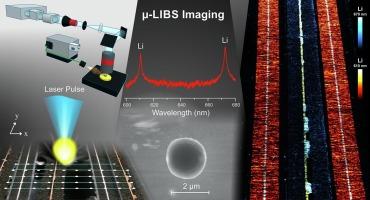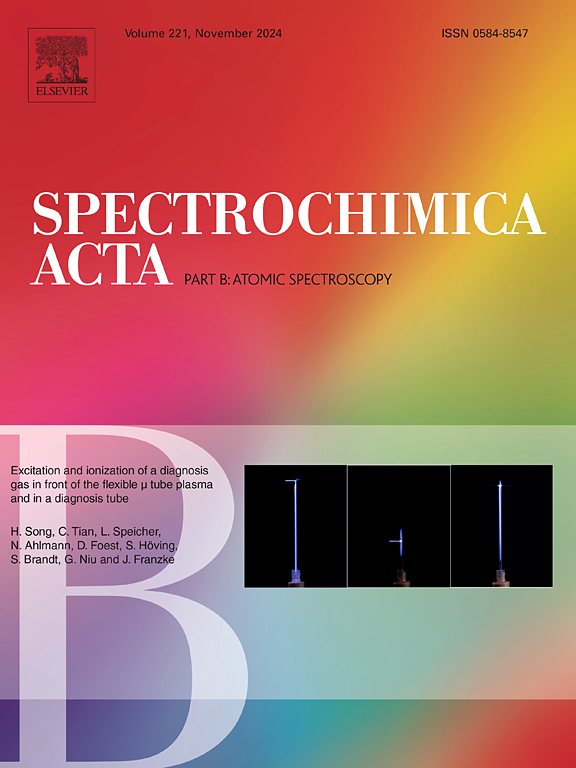Looking inside electrodes at the microscale with LIBS: Li distribution
IF 3.2
2区 化学
Q1 SPECTROSCOPY
引用次数: 0
Abstract
The enhancement of Lithium-ion batteries (capacity, power, life span, etc.) poses a significant challenge in the pursuit of decarbonizing individual modes of transportation. The behavior and performance of these batteries vary primarily based on the nature of their electrode materials, with some still undergoing development. To gain a deeper understanding of the aging mechanisms that occur during battery operation, it is essential to assess the distribution of lithium within the electrodes with the highest possible spatial resolution. In this study, we showcase the application of micro-LIBS imaging as a multi-elemental characterization tool for investigating the aging mechanisms. By employing a high numerical aperture (0.42) microscope objective and a short wavelength laser (266 nm), we have developed a high lateral resolution micro-LIBS imaging experimental device approaching 2 μm. Performance evaluation was conducted on a certified aluminum sample with a high silicon content (⁓18 %). The utility of this new micro-LIBS instrumentation in studying Nickel Manganese Cobalt (NMC) batteries, revealing the formation of preferential sites for inactive lithium in negative electrodes, is also demonstrated.

利用 LIBS 在微尺度上观察电极内部:锂分布
提高锂离子电池的性能(容量、功率、寿命等)是实现各种交通工具去碳化的重大挑战。这些电池的行为和性能主要因其电极材料的性质而异,其中一些材料仍在开发之中。要深入了解电池运行过程中的老化机制,就必须以尽可能高的空间分辨率评估锂在电极内的分布情况。在本研究中,我们展示了微 LIBS 成像作为多元素表征工具在研究老化机制中的应用。通过使用高数值孔径(0.42)显微镜物镜和短波长激光(266 nm),我们开发了一种横向分辨率接近 2 μm 的微 LIBS 成像实验装置。性能评估是在硅含量较高(⁓18%)的认证铝样品上进行的。此外,还展示了这种新型微 LIBS 仪器在研究镍锰钴(NMC)电池中的用途,揭示了负极中形成的非活性锂的优先位点。
本文章由计算机程序翻译,如有差异,请以英文原文为准。
求助全文
约1分钟内获得全文
求助全文
来源期刊
CiteScore
6.10
自引率
12.10%
发文量
173
审稿时长
81 days
期刊介绍:
Spectrochimica Acta Part B: Atomic Spectroscopy, is intended for the rapid publication of both original work and reviews in the following fields:
Atomic Emission (AES), Atomic Absorption (AAS) and Atomic Fluorescence (AFS) spectroscopy;
Mass Spectrometry (MS) for inorganic analysis covering Spark Source (SS-MS), Inductively Coupled Plasma (ICP-MS), Glow Discharge (GD-MS), and Secondary Ion Mass Spectrometry (SIMS).
Laser induced atomic spectroscopy for inorganic analysis, including non-linear optical laser spectroscopy, covering Laser Enhanced Ionization (LEI), Laser Induced Fluorescence (LIF), Resonance Ionization Spectroscopy (RIS) and Resonance Ionization Mass Spectrometry (RIMS); Laser Induced Breakdown Spectroscopy (LIBS); Cavity Ringdown Spectroscopy (CRDS), Laser Ablation Inductively Coupled Plasma Atomic Emission Spectroscopy (LA-ICP-AES) and Laser Ablation Inductively Coupled Plasma Mass Spectrometry (LA-ICP-MS).
X-ray spectrometry, X-ray Optics and Microanalysis, including X-ray fluorescence spectrometry (XRF) and related techniques, in particular Total-reflection X-ray Fluorescence Spectrometry (TXRF), and Synchrotron Radiation-excited Total reflection XRF (SR-TXRF).
Manuscripts dealing with (i) fundamentals, (ii) methodology development, (iii)instrumentation, and (iv) applications, can be submitted for publication.

 求助内容:
求助内容: 应助结果提醒方式:
应助结果提醒方式:


